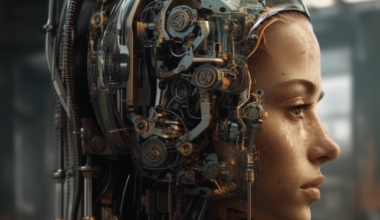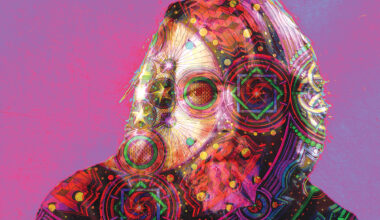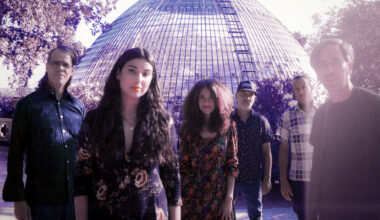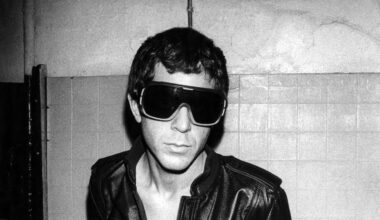With just a few rickety machines, Paranoid London are taking a new broom to the DIY spirit of acid house. On their latest album, abetted by Alan Vega and Arthur Baker, they’re bringing sleaze back to dance music
When the first acid house records arrived from Chicago around the mid 80s, they hit like lightning bolts of aural insanity, raw and disembodied in their alien strangeness. Even if nobody knew what to make of these gloweringly beautiful records from mysterious names like Phuture, Adonis, Sleezy D and Master C & J, they ignited a revolution after spiking initial UK stronghold The Haçienda followed by southern clubs revelling in the kind of euphoric carnage stoked by pioneering Chicago DJ Ron Hardy at the Muzic Box, acid house’s birthplace.
These records were simple and basic because they were created through poverty, early producers using DIY set-ups and secondhand gear to realise warped musical visions, shot with twisted, invariably sleazy lyrics and subject matter. Predictably, with the acid house explosion came big business and money (if not in the artists’ pockets), resulting in softened-up, slicked-down mainstream variations.
Although there were acid house revivals and an acid techno underground, electronic dance music became increasingly over-produced and facile, as laptops and downloads replaced analogue gear and vinyl. Then around 10 years ago, London duo Quinn Whalley and Gerardo Delgado got so riled by this airbrushing of the music’s vital soul elements, they released a clutch of below-the-radar 12-inches as Paranoid London that stripped the music back to those skeletal basics, deploying dirty 909 beats, chomping 303, scabrous synths and scuzzed-up guest vocals. The 12-inches started a buzz that swelled into a cult, with a debut album, 2014’s ‘Paranoid London’, collecting many of those tracks in one place.
Recorded specifically as an album, ‘PL’ is their breakthrough, upping their game with guests including the late Alan Vega, Arthur Baker, ACR’s Simon Topping, queer scene totem Josh Caffe, Warmduscher’s Mutado Pintado and murdered Californian gay activist Bubbles Bubblesynski.
“A lot of kids didn’t know about acid house until fairly recently,” says Whalley. “It just took somebody to come along and remind everybody to keep things really simple. We had this thing of just releasing it on record and not doing downloads, so people had to make an effort. You had to give a fuck in order to find it.”
In the original acid house tradition, there’s a tantalising air of mystery around the pair, though when we spoke it transpired Whalley and I had been Sabres Of Paradise labelmates (he was in Slack with Justin Drake, of ‘Painkiller’, I was one half of Secret Knowledge). There’s no way we didn’t collide in some sweaty, strobe-battered basement somewhere along the line.
Whalley and Delgado recount the story that, for the former, started with his parents taking him to the Boiler House in Kingston while still at school.
“It was mainly rare groove and hip hop, then some of the new Trax records,” says Whalley. “My mum and dad would take me places like The Wag. I didn’t even know what they were until later. I just thought it was a bunch of weirdos, then you find out you went to these amazing places everyone goes on about now. Seeing all these absolute lunatics is what grabbed both of us and essentially made us throw our entire lives away! It was the classic trajectory. We were hip hop kids who got into electro because it was the most happening thing. When house music came along, rock musicians had no idea how it was made. They didn’t consider it music. If you can find music that your mum and dad don’t like, that’s the best thing you can do.”
“We were both acid house kids who went to Land Of Oz and Rage, then spent years producing or working in record shops until we started working together,” adds Delgado, who worked at the fabled Fat Cat Records. “We were lucky because, when we started putting out tracks, people had begun doing stuff all on their computers; everybody was trying to make music sound like they’d done it in really expensive studios, like a great producer. Our thing was always, ‘this is a few minutes of someone’s life on a dancefloor, it just needs to be dead simple and effective’; a drum beat, bassline, some crazy vocals and you’re good. It was a good bit of timing. Without knowing it, everybody had got bored of mixing things well with layers and layers of nice-sounding tracks. Ours came along and reminded everybody it doesn’t need to be that difficult.
“When we chatted about what records we were into, it wasn’t the big anthems everyone knew. It was the tracks you didn’t know the names of that you lost yourself in and thought, ‘Wow, what was that called?’. We don’t have any desire to make big anthems. It’s the ones in between!”
“Del and I had been working together for years before Paranoid London,” continues Whalley. “We wanted to make music like we were hearing out; sometimes we’d try and make Derrick Carter-sounding records, or Danny Tenaglia… eventually we said, ‘Why are we trying to do stuff that sounds like other people? What it is that we like doing?’. We were mentally in love with acid house. The people that were doing it years ago weren’t trying to make raw, banging records; they just had limited equipment. Paranoid London is us trying to make records like other people but, because it’s your own thing or you’ve being doing it for so long, you end up with your own sound.
“Even from the start we had a perverse way of doing things. Records had died, and nobody would have thought to start a vinyl-only record label. So we thought we’d put out a single-sided 12-inch. Next we got Paris Brightledge, one of the great house music singers, to speak some Mark E Smith lyrics. When you finally gain confidence to do your own thing, it comes quite naturally. It’s a lot easier when you’re not worrying about fitting into everything else, and make your own rules. When there’s nothing to follow, it’s easier to work.”
The Brightledge connection came through manager Mark Potts tracking down Chicago’s original house producers who’d signed dodgy deals with mercenary chancers in the 90s.
“‘Paris Dub’ was the second we made with him, where he wrote the vocals,” says Whalley. “We could have made an OK house record with a Chicago house singer, or we could try and make something a bit more perverted. It worked out really nicely.”

In this world of earnest laptop boffins, genteel soundscapes and self-aggrandising regurgitators, Paranoid London’s new album is the biggest bomb to hit electronic music for years, harking back to the original Chicago house blueprint of using what they’ve got to make a noise with a beat.
“We’ve got an 808 drum machine, an original 303, 909, a 101,” says Whalley. “It’s done on that equipment because that’s what we know how to use. Sure, if we were 19 years old we’d be doing it all on laptops, but with our equipment, you turn them on if you want them to play on that bit of the pattern. It suits us, because we don’t spend a lot of time working on each track. When it’s essentially loopy music, you can’t spend three days mixing a track. If you spend too much time thinking about it, you start to lose momentum and it gets boring. That sort of equipment lends itself to getting stuff done quickly. We set the machines going and play with them for 10 minutes or whatever, then edit any bits where it gets boring and that’s the track.
“When computers started getting fast enough to do everything in the late 90s, early 2000s, we made the classic mistake of selling off the equipment thinking, ‘We can do it all on computer now’. We then spent years boring ourselves shitless and never finishing a record. So we had to start buying it all back. They cost a bloody fortune.
“We take them all over the world; they’ve taken a right battering, but they’re still going. A lot of times people go, ‘We can’t believe you’ve taken the 808 out with you!’, but we don’t see the point in having it otherwise. One of our greatest joys in life is when we’re doing the soundcheck and turn on our 808 and get that ‘boom’ through a huge sound system. The 303’s a bit battered so that doesn’t come out with us live now. We use it in the studio. We still use the 808 and 909 whenever we can get the luggage allowance on the plane.”
Even when it packs up…
“When we play live, half the time it’s all going wrong,” continues Whalley. “Sometimes we’ll soundcheck, then 10 minutes before the set, the 808 won’t turn on and we have to do it with the 909. Our 808 and 303 are fucked, but the beauty is nobody else has got one that sounds like ours. It’s always chaos, but that’s what we love and keeps it exciting.”
Alan Vega’s beyond-the-grave appearance on ‘Angel Of Hell’, unfurling his infamous screams over the kind of starkly malevolent acid riff that rears throughout the album, came about when Suicide played their last show at the Barbican in 2015 and Arthur Baker emailed PL asking if they’d like to remix a track he did with the singer years before.
“As a rule we don’t do remixes,” says Whalley, “but when an opportunity like that came up, we jumped at it. So it started as a remix of a track he’d done with Arthur. It never came out properly, so we got in touch with Arthur and said, ‘We think this would fit really nicely with the rest of the album, would you let us?’. Arthur, being the damned fine guy he is, said yes and we got Alan Vega on our album.”
Gay scene DJ-poet Josh Caffe lends vocals to ‘Starting Fights’ (its “turn around and you walk away” hook is pure Jamie Principle-Robert Owens angst) and acid love song ‘(Vi-Vi) Vicious Games’.
“He’s an amazing vocalist, one of the only people doing really sleazy vocals nowadays,” says Whalley. “He really doesn’t give a fuck. Everything that comes out of his mouth is dripping with sexuality. There hasn’t really been anybody that I know of that’s got that level of not-giving-a-fuckness for ages. He fitted in really nicely.”
The story of Bubbles Bubblesynksi’s appearance on fly-swatting 303 gouge-up ‘The Boombox Affair’ carries tragedy and cause.
“Bubbles was a DJ trans-activist who was the beating heart of the San Francisco scene,” says Whalley. “We met him at this festival in the hills in this village that had been taken over by Hell’s Angels in the 1970s, and got on really well. It was obvious we should do some music with him. We kept in touch, then, the week we were going to send him music to record vocals over, he got murdered outside a San Francisco strip club. When we were on tour in America about six months later, his friends said he’d been really excited about doing it. We thought if he was that excited about it, it would be a great thing to make that happen, so we recorded vocals off these videos on his Facebook page where he’d broken into a construction yard and held a rave on his own, then made a track with it. It just had to be done.“
PL arranged for any money that’s made from the record to go to charities Bubbles supported for transgender sex workers and LGBT rights in San Francisco.
“We wanted to make sure any money went to something Bubbles would have approved of,” says Whalley. “We’ve had messages from people all over the world. We only met him once but it’s been a really heart-warming thing to do.”
Warmduscher’s vocalist Mutado Pintado (who Whalley briefly played with in Black Daniel) rasps Bukowski-style New York gutter-dirt over ‘Nobody Watching’ and ‘Just My Size’.
“He’s an old promoter who used to take us to DJ at New York clubs in the early 2000s,” says Whalley. “He’s one of the most creative people I’ve ever met in my life; a painter, writer, poet, vocalist, also front man for Warmduscher, another great band. Everything he says makes you think of the sleazy side of New York nightlife and fits really well with our idea of what people should be listening in dark, sweaty nightclubs.”
Anyone who’s heard Warmduscher will know that Pintado perfectly fits PL’s ethos that today’s music is too well-scrubbed, including its short-back-and-sides hipsters. Cleanly-scrubbed heads means similar music, with no funk, soul or style.
“What got us into the clubs were the freaks and the weirdos,” says Quinn. “But it gradually seems to be pushed further and further out.”
“With acid house you had the freaks and straight white kids prepared to push boundaries and get involved as well,” adds Delgado, “really normal kids who wanted to be part of the scene. The music seems to have got a bit generic, recently. It’d be nice to bring a bit of sleaze back to it all.”
Simon Topping makes a rare showing on ‘Cult Hero (Do You Wanna Touch Me)’, intoning over Master C & J strings. It was long-time ACR fan Delgado’s big moment.
“I adored ACR growing up,” he says. “It’s that Manc kid white boy trying to play funk badly. We were in Swindon at a festival, and bumped into Haçienda DJ, Jon DaSilva. I asked if he knew ACR, and he gave me Simon’s number. Simon bought his own ticket, came down to London, recorded and that was it. He’s a legend. He just fitted perfectly into what we do. ‘Cult Hero’ is devastatingly simple, but nobody else could have come up with it. If we can make kids go back and find out who ACR are, it’s a good thing; point them to decent music from the 80s so they can make stuff that’s better than the crap we’re listening to now. It’s good to use people like Alan Vega or Simon, so people discover their albums, then go and make their own music.”
The guest shots should not be allowed to detract from PL’s own tracks, like the pressure cooker 808-909 assaults of ‘Drum Machine’, ‘The Music’, bucket-scraping house vamp ‘Sly Is Watching’ and squelching 303 rhino semen blast of ‘Blue-Ish’. Such raw onslaughts have already repelled Ibiza’s elite.
“We got booked to play Ibiza, showed up and it was like a super-rich yachting club,” laughs Whalley. “We were supposed to do three dates, but did our thing and next week they emailed our agent and said, ‘We’ll pay them not to come back’. They paid us the rest of the money not to terrorise them again!”
A wild, long-smothered electronic gene is back; alive, kicking and fired by acid house’s original punk spirit. And now it looks like going viral.






